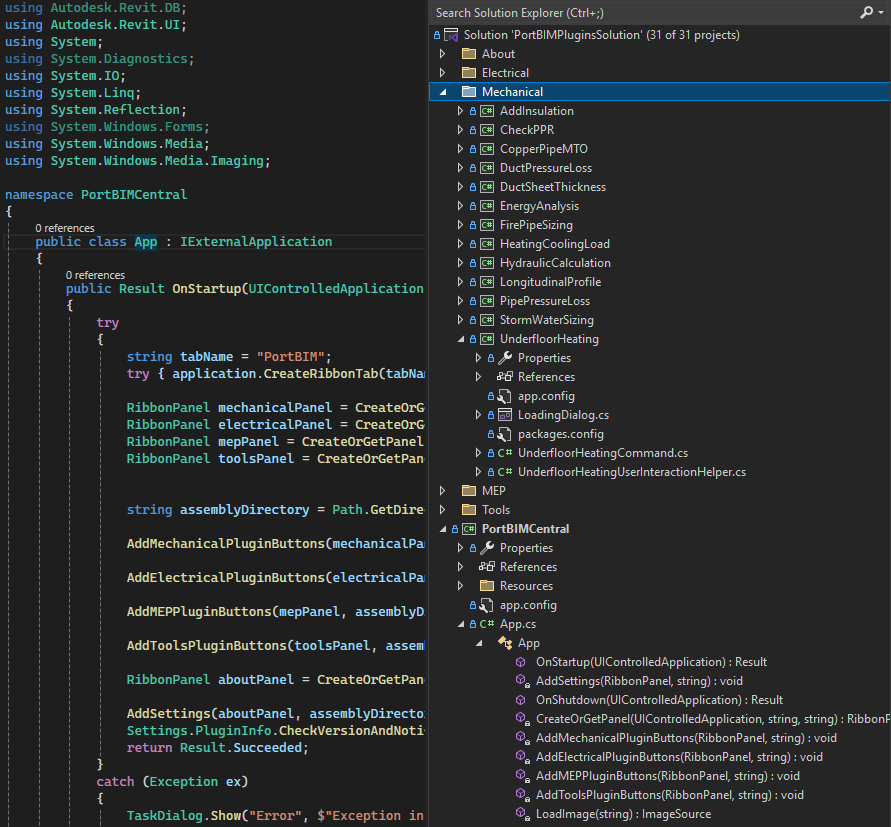Coding & Automation
We analyze workflows to define clear automation strategies, then build robust C# Revit plug-ins and Dynamo scripts for parametric tasks . Integrated into project templates, our tools automate clash detection, documentation, and compliance checks. We enforce strict QA/QC, deliver tailored training and documentation, prototype AI-enhanced features, and maintain 100+ custom tools for continuous improvement.

Strategy & Framework
Our coding and automation services begin with a thorough analysis of project requirements and workflow bottlenecks. We collaborate with stakeholders to map out key tasks—from model generation to compliance checks—and define a clear automation roadmap. By aligning our development strategy with client objectives, we ensure that every script and plug-in delivers maximum impact, reduces manual effort, and integrates seamlessly into existing Revit and BIM environments.
C# Plugin Development
Leveraging deep expertise in C#, our team crafts bespoke Revit plug-ins that extend native functionality with precision. Whether it’s automating sheet creation, custom parameter management, or complex routing logic, our tools adhere to Revit API best practices and are rigorously tested for performance and stability. More than 100 custom tools in our library testify to our commitment to robust, maintainable, and scalable C# solutions.

Dynamo Scripting & Parametric Workflows
In addition to C#, we harness Dynamo to build visual scripts that empower users to automate repetitive modeling tasks without writing code. Our Dynamo workflows handle parametric family placement, data extraction, and geometry manipulation, enabling rapid iteration and on-the-fly design adjustments. Combined with custom nodes and Python integrations, these scripts foster greater design exploration and facilitate on-demand automation for non-developers.
Workflow Integration
Automation is most effective when it’s part of a cohesive workflow. We integrate our plug-ins and scripts directly into project templates and collaboration platforms, ensuring that tasks like clash detection, annotation, and export routines trigger automatically at predefined milestones. This unified approach eliminates silos between design, coordination, and documentation, resulting in faster delivery and fewer errors.
Quality Assurance & Compliance
Every line of code we deliver undergoes strict QA/QC procedures, including peer reviews, unit testing, and integration testing within sample Revit projects. Automated compliance checks embedded in our tools verify code adherence to BIM standards and project-specific requirements, alerting users to any deviations in real time. These safeguards uphold the highest levels of accuracy and reliability, critical for mission-critical engineering projects.
Collaboration & Training
To ensure smooth adoption, we provide hands-on training and comprehensive documentation for all our automation solutions. From in-person workshops to video tutorials and annotated code examples, our support empowers client teams to customize and extend tools as needed. We also establish feedback channels that feed directly into our development cycle, enabling rapid iteration and continuous enhancement.

Innovation & AI Integration
Staying at the forefront of technology, we explore AI-driven approaches—such as machine-learning algorithms for layout optimization and predictive maintenance scripting—to push the boundaries of what automation can achieve. Prototypes include smart parameter tuning, automated clash-resolution suggestions, and data-driven model quality assessments. These innovations promise to further elevate efficiency and decision-making in design workflows.
Continuous Improvement
Our commitment to excellence extends beyond initial delivery. We maintain and update our coding libraries—now boasting over 100 specialized tools—with new features, performance optimizations, and compatibility enhancements for each Revit release. Regular post-project reviews capture lessons learned and best practices, ensuring that our automation ecosystem evolves in lockstep with industry advancements and client needs.